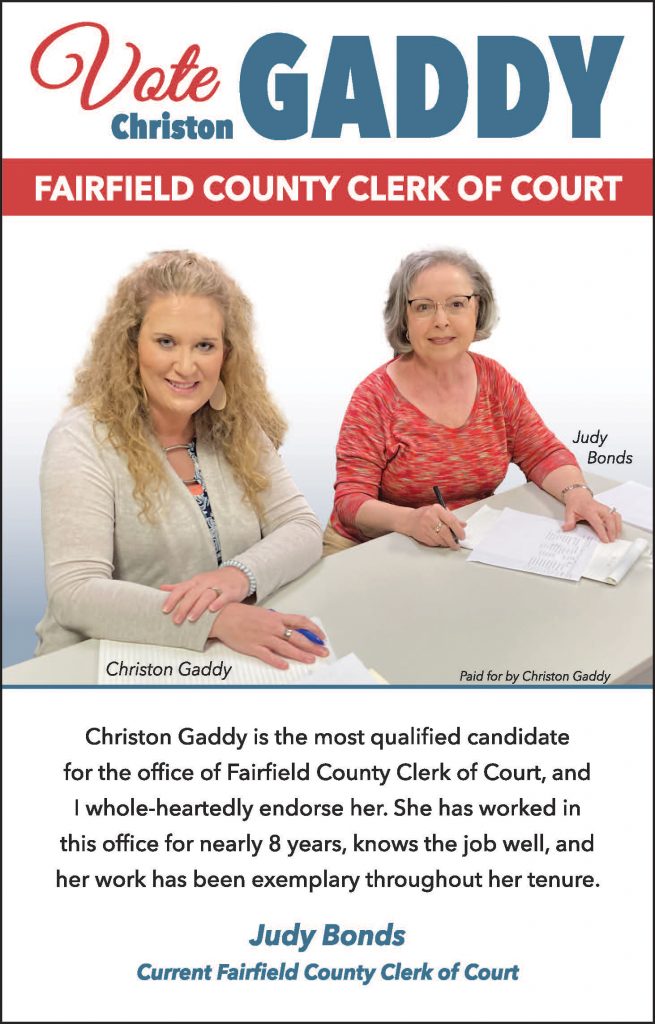New Policy Would Require Statements in Writing
WINNSBORO – A second attempt in as many months by the Fairfield County School Board to revise the way for-the-record statements are recorded in their minutes passed first reading during the Board’s Feb. 17 meeting, although not without considerable debate. Indeed, should the policy clear second and final reading next month, the revision may well be in direct conflict with state law.
Where previously Policy BEDG, Minutes of Board Meetings, provided for the inclusion of “any other information that any member requests be included or reflected in the minutes,” the proposed revision to the policy would require those for-the-record statements to be submitted in writing.
According to the revised policy, for-the-record comments will be “limited to written materials germane to the public agenda.” Those materials would also be limited to five pages, front and back, unless granted a special exception by the Board chairperson. The statement “must be presented in writing to the board’s secretary or the board chairman at the time of the meeting.”
The written statements would be “designated as an attachment to the minutes,” the policy states, and not as part of the minutes themselves. The chairperson would also have “the prerogative to rule any such request out of order for the reason that such materials are not germane to the agenda, are inappropriate as an attachment or that the materials are otherwise publicly available; such ruling by the presiding officer will stand unless overturned by the board majority.”
The S.C. Freedom of Information Act (FOIA), however, which governs, among other things, how public bodies maintain records of meetings, contains no such provisions regarding the minutes of meetings.
The S.C. FOIA, under Section 30-4-90, requires that all public bodies keep minutes of public meetings. Minutes must include, but need not be limited to: 1) The date, time and place of the meeting; 2) The members of the public body recorded as either present or absent; 3) The substance of all matters proposed, discussed or decided and, at the request of any member, a record, by an individual member, of any votes taken; and 4) Any other information that any member of the public body requests be included or reflected in the minutes.
An attempt to reword the fourth provision altogether during the Board’s Jan. 20 meeting, replacing “any other information that any member requests be included or reflected in the minutes,” with “specifically, the minutes will include what is done, not what was said,” was pulled from consideration after Board member Paula Hartman (District 2) pointed out that such a change was not in compliance with the FOIA.
During the Feb. 17 meeting, Hartman again questioned the policy change, as did Annie McDaniel (District 4), who said the policy change was an attempt by the Board’s majority to muzzle its minority.
“Disrespect for the minority on the Board, that’s what’s causing this,” McDaniel said. “I’m pleading with this Board to come up with a better way to deal with the conflict that we have other than trying to put policies in place.”
Henry Miller (District 2) said the policy was a way for Board members to stand behind and take ownership of statements they make for the record, while William Frick (District 6) said his understanding was that the policy would ensure statements were reflected accurately in the minutes.
But McDaniel said a written statement provided after the fact would be less accurate, not more.
“If a person says they want a statement for the record and they go back and rewrite that statement, it is not going to be the same thing,” McDaniel said. “The minutes are supposed to reflect that particular statement.”
Board Chairwoman Beth Reid (District 7) said so many for-the-record statements were slowing down the compilation of the minutes. The change in policy would relieve some of that pressure from the Board clerk. Frick agreed, but cautioned the Board to be wary of the law.
“The statute is pretty broad, and the First Amendment is pretty broad,” Frick said. “I just want to make sure that we’re clear as we discuss this, you will have that opportunity to revise and extend your remarks as necessary as long as they comport with the germaneness of the issue that’s being discussed.”
Dr. J.R. Green, Superintendent, said the District had drafted the policy based on a similar policy in place at Lexington-Richland District 5. A nearly verbatim policy can be found on that district’s website, which shows the policy was last revised in June 2012.
“The minutes are not an opportunity for someone to write a statement to put in the (minutes) that was not something that was actually said at the meeting,” McDaniel said. “The Freedom of Information Act gives a person an opportunity to put things on the record, even if (that person is) in the minority.”
First reading passed 4-2, with McDaniel and Hartman voting against. Frick, who placed the motion on the floor, Miller, Reid and Carl Jackson (District 6), who offered the second, all voted in favor. Andrea Harrison (District 1) was not present. The Board will meet again on March 17 at 6 p.m. in the District office.












